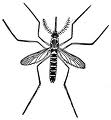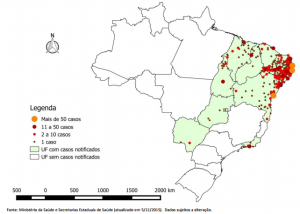Genetically Modified Mosquitoes Released in Brazil in 2015 Linked to the Current Zika Epidemic?

This seems like a case to me where mankind’s arrogance may have backfired on us.
Here is Oxitec back in 2015 proudly announcing that their GM mosquito has decimated the local mosquito population in a field trial:
http://www.oxitec.com/press-release-oxitec-mosquito-works-to-control-aedes-aegypti-in-dengue-hotspo/
Releases of the genetically engineered Oxitec mosquito, commonly known as ‘Friendly Aedes aegypti’, reduced the dengue mosquito population in an area of Juazeiro, Brazil by 95%, well below the modelled threshold for epidemic disease transmission.
Here is a map showing where Juazeiro is located.
Here is a map showing where all the deformed babies are being born.
Zika was first confirmed in Brazil in may of 2015, but had been seen in other nations before. Question: Why didn’t it cause an epidemic of birth defects in any other countries? How exactly would you miss a tenfold increase in children born with most of their brain missing? Zika in Brazil does not seem to behave like the Zika we were familiar with before.
How could the Zika catastrophe be linked to genetically modified mosquitoes?
The OX513A strain of male mosquitoes released in Juazeiro creates larvae that normally die in the absence of antibiotics, which is supposed to help decimate wild mosquito populations when these males are released in the wild. Problem here being of course, that “life, uh, finds a way”. An estimated 3-4% of the larvae survive to adulthood in the absence of the tetracycline antibiotic. These larvae should then be free to go on and reproduce and pass on their genes. In fact, they may be the only ones that are passing on their genes in places that have their wild mosquito population decimated by these experiments.
What is the effect on these mosquitoes that grow up with a mutilated genome? It is thought that this should introduce a fitness cost, that is, they should have greater difficulty surviving. What do we know about these mosquitoes? Has adequate research ever been done on how a genetically mutilated mosquito copes with viral infections? Could the mosquito be more susceptible to certain pathogens, that it then passes on to humans?
If a pathogen like the Zika virus can thrive in the mosquito without restraint, it could evolve into something far more dangerous than its original incarnation, pulling the lever on the slot machine with every replication until it hits the genetic jackpot.
Is it too much to ask for a moratorium on these types of genetic experiments?



